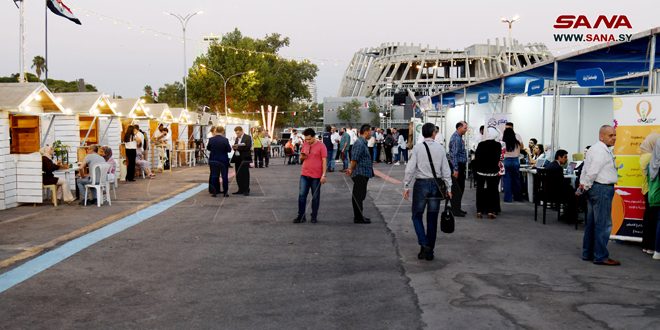Distinctive student projects and innovations displayed at Al-Basel Exhibition for Creativity and Invention on the grounds of the Old Fairgrounds in Damascus
Damascus (ST): Distinctive student projects and innovations were hosted by Al-Basel Exhibition for Creativity and Invention, which opened its 21st session yesterday on the grounds of the Exhibitions Old City in Damascus, and will continue until the twenty-seventh of this month.
Engineer Omar Al-Jubai, a member of the executive office of the National Union of Syrian Students, explained in a statement to news correspondent that 75 students from public and private universities and institutes are participating in the exhibition with a group of projects and innovations distributed among the exhibition’s axes that include medicine, environment, alternative energy, industry, technology and agriculture. He indicated that they are valuable projects that touched on what the labor market and the reconstruction stage requires, and they are distinct innovations, some of which are patented and the other part are pending patenting.
Al-Jubai underlined the importance of the exhibition in terms of encouraging scientific research and discovering the creativity of the young generation and universities and turning them into productive projects on the ground. Also, the prizes that will be awarded at the exhibition will be an incentive for students to continue working during the coming period.
Student Muhammad Abdel-Sattar Nafees, majoring in medical engineering, and his colleagues presented a project in the field of medicine, which is an orthopedic device for the hip, knee, ankle and foot to help paralyzed lower limbs walk. The device that is worn from the hip to the ankle contains motors and sensors that help the patient to dispense with the wheelchair and walking without assistance.
In turn, student Wassim Al-Ajaj presented in the industry axis a project that includes a self-propelled robotic arm whose task is to classify and sort shapes using image processing technology and artificial intelligence, indicating that the project’s goal is to save time and effort and carry out work with high accuracy, in addition to providing a statistical application that contributes to raising the efficiency of the production line through analyzing the results of the screening process.
Student Hammam Wannous from the Faculty of Mechanical and Electrical Engineering at the University of Damascus spoke about his and his colleague’s project, explaining that it includes designing and implementing a connection panel between a backup generator and critical loads, while controlling the separation and connection of loads to maintain continuity of feeding the different loads. He explained that the importance of this type of system lies in not interrupting feeding for any reason from very critical loads such as operating rooms and respirators.
K.Q.

